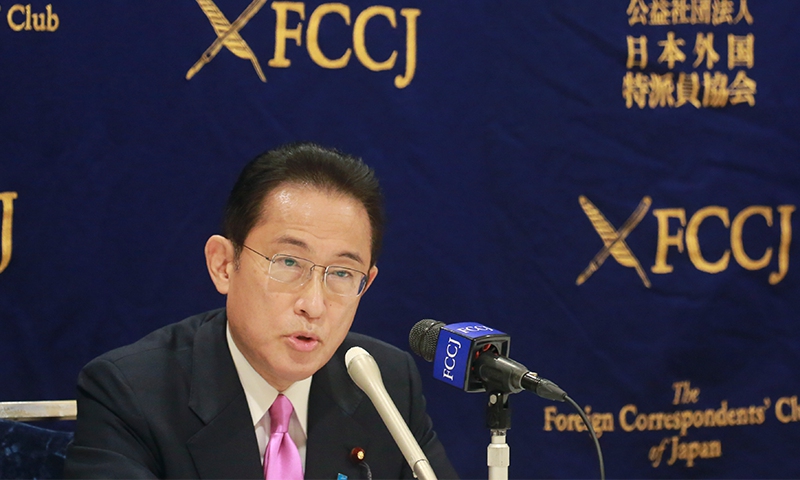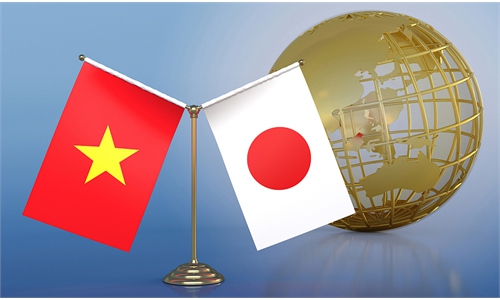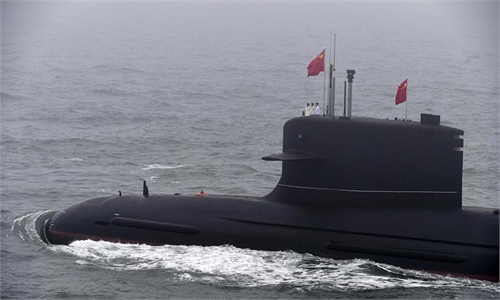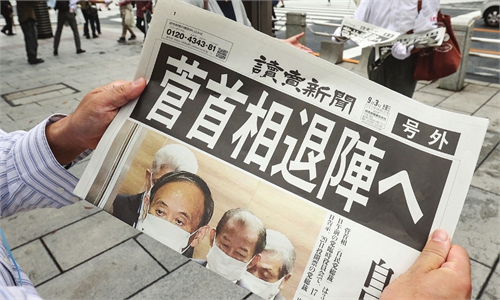
Fumio Kishida, Japan's ruling Liberal Democratic Party lawmaker and former foreign minister Photo: VCG
As the race to fill the seat of Japanese Prime Minister Yoshihide Suga as leader of the ruling Liberal Democratic Party (LDP) heats up, bashing China, the most focal point of this election, is also gaining momentum among candidates, with most prominent figures repeatedly challenging China's bottom line, including on the Taiwan question.
Analysts have warned that Japanese politicians' harsh rhetoric for winning election is one thing, but "toxic" hawkish anti-China rhetoric will poison Japan's overall relationship with China. At that time, the next Japanese leaders will encounter tremendous difficulty when they attempt to mend fraying ties. Those anti-China remarks will be like time bomb for one's political career, as those politicians won't be able to fulfill their pledges no matter who takes office.
The Taiwan question is a further test for Japanese politicians' collective "political wisdom." If it is not handled properly, playing with this hot button issue will lead Japan down a dangerous road.
Fumio Kishida, a prominent candidate for LDP leadership, vowed Monday to counter China's growing influence by working closely with the US and other "like-minded" democracies.
Kishida made those remarks at a conference introducing his policy blueprint. The former Japanese foreign minister was the first to declare he will be running for LDP leadership in late August, even before Suga confirmed in earlier September that he would be stepping down.
He promised to create the post of special adviser to the prime minister on human rights issues if elected, and this adviser would deal with China's alleged human rights abuses in China's Xinjiang and Hong Kong, Kyodo News reported.
The candidate also emphasized "ensuring peace and stability across the Taiwan strait," reported Kyodo.
Another candidate, Taro Kono, who is also widely regarded as "China hawk", the current vaccine minister who once served as foreign minister and defense minister under Shinzo Abe, Suga's predecessor, published his new book, Move Japan Forward, this August. During which Kono argues that Japan needs to respond to China not just by strengthening its alliance with the US but through a more robust regional framework built around security and economic ties.
Sanae Takaichi, an Abe disciple and former internal affairs minister, who launched her bid to lead LDP, has also reportedly said she would introduce policies to fend off China's technological threat to help strengthen the economy.
The LDP leadership election is scheduled for September 29 and campaigning will begin this Friday. The new LDP leader is expected to dissolve the lower house for a general election in the first half of November, in which they are virtually assured of retaining the premiership because of the party's dominance.
In the eyes of Chinese analysts, aggressive speeches targeting China can be regarded as something of a "public stunt for election," given strengthening of conservative forces within the LDP, a tough stance toward China can help them win more votes.
Kishida, who was once known for his friendly stance toward Beijing, jumped to the front line of attacking China, a move that is seen by analysts as Kishida's attempt to showcase his "toughness" within LDP and for Japan's public.
The deep-seated reason is that fraying China-Japan ties and Japan's close cooperation with the US on Indo-Pacific policy aimed at containing China's rise, is driving the LDP candidates to take a tough stance on Beijing, Lü Chao, a research fellow at the Liaoning Academy of Social Sciences, told the Global Times.
China-Japan ties have deteriorated further ever since Tokyo signed a joint statement with Washington in April, lashing out at China in various fields, ranging from human rights to the Taiwan question.
Before he steps down, Suga will travel to the US to attend "QUAD" meeting, with Australia and India to strengthen ties amid China's growing clout in the Indo-Pacific region, the Japan Times reported.
The report also cited Japanese government sources as saying that "Whoever is chosen as the next prime minister will strive to (maintain) the Japan-US alliance, so it is important to deliver the message that we are focused on the alliance through the prime minister's US visit."
Lü said that the US is keen on putting Japan on the front line of its Indo-Pacific strategy to confront China, especially on the Taiwan question; yet Tokyo is hesitating as tagging along behind Washington will also put Tokyo in the front line of China's counterpunch, which will be detrimental to Japan's own interest.
It is also true that a politician that excessively relies on the US will also meet strong backlash domestically in Japan, and such a foreign policy that is lack of independence will be hard to sustain for the island country, said the expert.
'Short-sighted' move
Observers called candidates vying for votes by attacking China a rather "short-sighted" move.
Interacting with Beijing, the top trade partner of Tokyo for 14 consecutive years, is inevitable for the next Japanese Prime Minister, said Lü, noting that strong economic ties are particularly important for Japan ravaged by pandemic.
Experts believe that it's a calculated move for prime ministerial candidates to attack China during election or during the early stage in their tenure, yet few are willing to challenge China's bottom line on core issues, as it will trigger a catastrophe that Japan is unable to bear, according to Lü.
After Abe took power in 2012, relations between China and Japan had hit a nadir over the Diaoyu Islands. However, during the later period of his administration, the China and Japan have experienced a "honeymoon period" since Abe kicked off an official visit to China in October 2018. In September 2019, Abe recorded a special video to congratulate the 70th anniversary of the founding of the People's Republic of China, a rare occurrence in Japanese politics.
Yet analysts warned that Japan should not let the "toxic" China-bashing tactics run wild. Da Zhigang, director and research fellow of the Institute of Northeast Asian Studies at Heilongjiang Provincial Academy of Social Sciences, warned that the aggressive rhetoric during the election could further worsen the public's goodwill toward China, forming a "vicious circle," which could only further damage China-Japan ties across culture, economic, trade cooperation and political mutual trust aspects, and ultimately harms Japan's national interests.
"Once the soil of mutual exchange is poisoned, politicians will face great difficulty in reversing ties," Lü opined.
Experts also said that currently, Japanese political circle is full of politicians that blindly follow the US, yet lacks the ones that has vision and can lead Japan to reshape its relation with China and pursue the country's old glory.
Experts have also predicted that no matter who takes office, the Taiwan question will be a card that Japan will use to bargain with China. "Yet Taiwan question is a core issue of China and how to handle Taiwan question is a test to Japanese politicians' wisdom. If they [Japanese politicians] have enough wisdom, they should not sound out with Taiwan question, it's dangerous. And by doing that, Japan is playing with fire," said Da.
In response to Kishida's playing of the Taiwan card, spokesperson of China's Ministry of Foreign Affairs Wang Wenbin said on September 3 that Taiwan question concerns the political bases of China-Japan relation.
"We seriously urge relevant individual in Japan to refrain from interfering in China's internal affairs in any form and to refrain from sending wrong signals to 'Taiwan independence' forces in any form," said Wang.
Da predicted that after the new government is sworn in, China-Japan relations are "very likely" to suffer from heightened tensions. However, given Japan's deep dependence on China in terms of economic and trade exchange, it's unlikely that the new government would try to decouple with China, so the bilateral ties would be "Challenges outweigh opportunities and frictions outweigh cooperation," Da stated.





